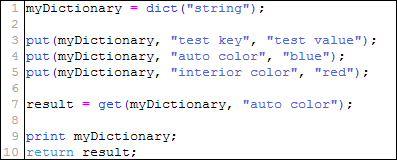Functions
Dictionaries are used to store key value pairs. Their purpose is similar to that of an array or Data Table. A dictionary key is used to look up a value. Dictionaries allow users to store and retrieve data quickly and easily. Once you have created a dictionary, values are stored using a key. You can attach a value with any data type to a dictionary, except another dictionary. When you declare a dictionary, ensure to declare what data type is needed.
This is a dictionary function that checks to see if the key is found in the dictionary.
Syntax: containskey(dictIdentifier, key)
Parameters:
| Parameter | Data Type | Description |
|---|---|---|
|
dictIdentifier |
Dictionary | Identifies the dictionary being searched to find if it contains the key you have identified. |
|
key |
String, Integer, or Float | Unique identifier for the value parameter. |
Return Type: Boolean
Example:


This function is used to create a dictionary of a specific data type, which is specified by the dictType parameter.
Syntax: dict(dictType)
Parameters:
| Parameter | Data Type | Description |
|---|---|---|
|
dictType
|
|
Specify the data type of the dictionary. |
Return Type: Boolean
This function supports the addition of multiple types of
objects in a dictionary. The dictionary get( ), put( ), and keys( ) functions
also now support the addition or retrieval of values or keys from a
dict<anytype>.
Syntax:dict(String <anytype>)
| Parameter | Data Type | Description |
|---|---|---|
|
<anytype>
|
String
|
|
Sample Input:
d1 = dict("anytype");
put(d1, "key1", "value1");
jObj = json("{\"K1\":\"V1\"}");
put(d1, "key2", jObj);
Return: A dictionary to contain key-value entries of various data types is created and two key-value entries are inserted into the dictionary.
This function retrieves the value of the provided key from the dictionary.
Syntax: get(dictIdentifier, key)
Parameters:
| Parameter | Data Type | Description |
|---|---|---|
|
dictIdentifier |
Dictionary | Identifies the dictionary you are retrieving values from. |
|
key |
String, Integer, or Float | Unique identifier for the value parameter. |
Return Type: The return type is based on the dictionary data type
Example:
Below, three separate keys and values have been defined and placed within the same dictionary.


Use this function to retrieve an unordered String Array of all keys found within a Dictionary. If the Dictionary does not contain any keys, an empty array is returned.
Syntax: keys(Dictionary dictionaryIdentifier)
Return Type: All keys will be cast as a String and returned in an array in no particular order.
Example :
d= dict("string");
put(d, "1", "string1");
put(d, "2", "string2");
put(d, 1, "string3");
put(d, 2, "string4");
return keys(d);
This function will return a string array with 4 string elements.
Once a dictionary has been created, you can define keys and values to put into the dictionary.
Syntax: put(dictIdentifier, key, value)
Parameters:
| Parameter | Data Type | Description |
|---|---|---|
|
dictIdentifier |
Dictionary | Identifies the dictionary you are adding values to. |
|
key |
String, Integer, or Float | Unique identifier for the value parameter. |
|
value |
String, Integer, or Float | Data value that relates to the unique key identifier. |
Return Type: Boolean
Example of put():


Gets the array of the values of all the dictionary entries.
The dictionaries supported are: "string", "integer", "float", "string[]", "integer[]", "float[]", "date", "date[]",
Note: Double dimensional dictionaries, boolean dictionaries, and dictionary anytype are not supported by the values function.
Syntax: values(Dictionary dictionaryIdentifier)
Example:
d= dict("string");
put(d, "key1", "string1");
put(d, "key2", "string2");
return values(d);
This function will return a string array with 2 string elements.
Notes
Dictionaries have better speed and performance than performing table cells.
- NULL and blank Integer values are treated as separate values:
- NULL= 0
- Blank = ""
- Using NULL as an attribute value is strongly discouraged.
- If you use logic that tests for NULL values in rule conditions or BML, confirm that the logic takes this difference into account.





